
 Flash News
Flash News
Germany extends the stay of its troops in Kosovo
Greek police raid Albanian cells in Korydhalos, discover arsenal and drugs at "prison mafia boss"
The famous soprano of TKOB passes away prematurely
Sailing suspended due to bad weather in Vlora
Megaoperation/ Group based in Durres, names of Albanian traffickers revealed
Albania towards the public debt crisis, the government is silent

Local experts have joined international organizations, calling on the Albanian government to be careful about raising the level of public debt.
After the 2019 earthquake, the COVID-19 pandemic and historical spending levels, including dozens of public-private partnerships, Albanian public debt is estimated at somewhere between 80.1% to 86%.
The Albanian government does not officially count PPPs in public debt, which means that the current figure is much higher than warned.
"The government should control with an iron fist every public expenditure and on the other hand improve the business climate that leads to the expansion of the tax base that will lead to an increase in budget revenues and in three to five years, Albania. can be in a better economic position ", said economist Zef Preçi.
Economics experts have urged the government to be careful with public spending to avoid a catastrophic situation. The current government promised to reduce public debt to 60% over the next four years, but that does not seem likely.
"As long as the government does not respect the minimum criterion for each year that the debt is lower than last year, it will not decrease. "While the opposite happens, this objective has no way to be achieved", said Preçi.
The government has increased public debt by about 2 billion euros in the last two years. Most of it was used to fund disaster-related projects.
The government also authorized debt increases to finance several long-term projects, such as the construction of the New Ring Road, the National Theater and the Llogara Tunnel. At the same time, funds are needed for pandemic and earthquake recovery.
Debt expansion is done through a normative act, breaking a fiscal rule set out in the budget law, which does not allow fiscal measures that increase debt as a percentage of GDP.
Over the past year, the government has increased public debt at faster rates than the country's economic growth and wages. House prices have also risen by more than 40% in the last four years, pushing many locals out of the market.
The International Monetary Fund (IMF), in its latest report on Albania in December last year, expressed concern about the country's growing fiscal risks and the lack of accurate data on public-private partnership (PPP) projects.
Arbitral rulings, the new private sector guarantee scheme and support for energy companies are also seen as added risks that increase unreported liabilities. Last week, President Ilir Meta warned the government that the situation had evolved into a "serious crisis".
Meta called on the Ministry of Finance to urgently publish the current level of public debt, including hidden financial commitments stemming from the public-private partnership and the like. The government has not responded.
Source: Euroactiv
Latest news



Germany extends the stay of its troops in Kosovo
2025-05-21 22:19:22
Journalist: Xhevdet Troplini alongside a politician
2025-05-21 22:00:07
Amnesty International: Camps in Albania, a reflection of an inhumane system
2025-05-21 21:49:09
This is the first Albanian justice collaborator
2025-05-21 21:39:45
Bitcoin breaks historical record: Reaches $109,302
2025-05-21 21:36:06
Raped by colleague at the civil registry office, victim fired from job
2025-05-21 21:08:47
Hyn në fuqi vendimi i BSH/ Kredia për blerje banese kufizohet nga 1 korriku
2025-05-21 21:04:37
“Nga dhuna e burrit humba fëmijën”, nëna e dy të miturve kërkon drejtësi
2025-05-21 20:50:23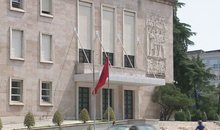
The government extends the stay of Ukrainians in Albania
2025-05-21 20:45:04
Social networks: Friend or foe of our personal relationships?
2025-05-21 20:22:33

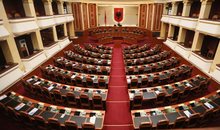



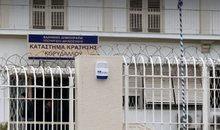

The famous soprano of TKOB passes away prematurely
2025-05-21 18:27:50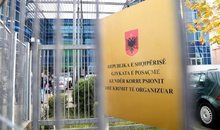

Donald Trump's son says he might one day run for US president
2025-05-21 17:53:20

Israel's Eurovision result raises questions about voting
2025-05-21 17:23:29
Florence, two Albanians arrested with 23 kg of cocaine
2025-05-21 17:03:20
Sailing suspended due to bad weather in Vlora
2025-05-21 16:58:12
The abolition of the vote as a triumph of banality
2025-05-21 16:41:56


Operation "Bridge"/ Ekil Nderjaku is sentenced to "prison arrest"
2025-05-21 16:08:32

Who needs more physical exercise: Women or men?
2025-05-21 15:43:25
Former Ukrainian politician shot dead near a school in Madrid
2025-05-21 15:32:18
Operation "Bridge"/ Ekil Nderjaku is given another security measure in his cell
2025-05-21 15:22:37
Chocolate will reach high prices! Cocoa production in serious crisis
2025-05-21 15:11:34




"Grandma", "beast", the nicknames used by Albanian and Italian traffickers
2025-05-21 14:26:47
Pope Leo asks Israel to allow humanitarian aid into Gaza
2025-05-21 14:18:42

Document/ How did Nuredin Dumani hit Xhevdet Troplini's group of traffickers?
2025-05-21 14:05:45

Megaoperation/ Group based in Durres, names of Albanian traffickers revealed
2025-05-21 13:42:44
Former politician shot dead outside his children's school
2025-05-21 13:39:27
A ka BE-ja ende mjete efektive për t'i shkaktuar dhimbje Rusisë?
2025-05-21 13:26:33
Berisha: We will never accept such choices, no one can force us to accept them
2025-05-21 13:25:29




A 24-year-old man was found dead in Lake Farka.
2025-05-21 12:37:34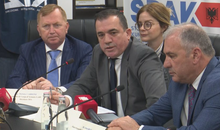

The abolition of the vote as a triumph of banality
2025-05-21 12:18:53

The only name for May 11th is: Electoral Terrorism
2025-05-21 12:06:25

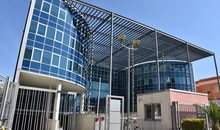
Letter-order from Belgium, SPAK checks 4 premises, 33-year-old arrested in Berat
2025-05-21 11:37:31
Hajj 2025/ Everything you need to know about the annual pilgrimage to Mecca
2025-05-21 11:28:43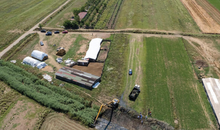
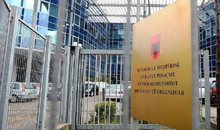
The appeal of the GJKKO leaves the head of the Road, Roven Zeka, in prison
2025-05-21 11:02:16

Kuçova! 66-year-old man sexually harasses 17-year-old girl
2025-05-21 10:41:40

Mental disorders and obesity threaten adolescents
2025-05-21 10:22:04

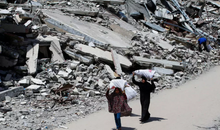
19 killed in Gaza by Israeli attacks, most of them children
2025-05-21 09:50:03
Tabaku: SP seeks to usurp independent institutions
2025-05-21 09:40:19



Is the Socialist Party's supermajority a danger to democracy?
2025-05-21 09:01:54


Video/ Explosives found at Veliera in Durrës, near Vangjush Dako's apartment
2025-05-21 08:32:15
The lack of flights at Vlora airport jeopardizes tourism guarantee contracts
2025-05-21 08:22:54
Horoscope, what do the stars have in store for you today?
2025-05-21 08:09:02

Morning Post/ In 2 lines: What mattered yesterday in Albania
2025-05-21 07:47:36







38 people arrested for conspiracy in Venezuela, among them an Albanian
2025-05-20 21:18:15
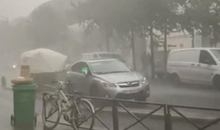
Torrential rainfall hits southeastern France, 3 confirmed victims
2025-05-20 20:49:14

Shehaj: Our votes will never unite with Edi Rama
2025-05-20 20:24:31
The ship "Butrinti" rescues 13 migrants in the Aegean Sea, including 2 children
2025-05-20 20:01:12
Video/ Revolt in Corfu prison, Albanians and Georgians set fire to cells
2025-05-20 19:51:04
Biden diagnosed with cancer, questions about his health in the White House
2025-05-20 19:37:01


